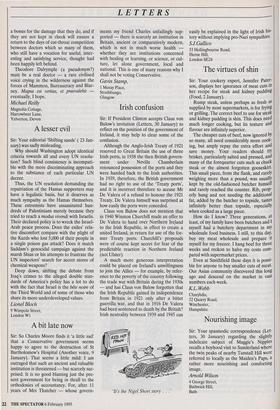Irish confusion
Sir: If President Clinton accepts Claus von Bulow's invitation (Letters, 30 January) to reflect on the position of the government of Ireland, it may help to clear some of the confusion.
Although the Anglo-Irish Treaty of 1921 reserved to Great Britain the use of three Irish ports, in 1938 the then British govern- ment under Neville Chamberlain renounced possession of the ports and they were handed back to the Irish authorities. In 1939, therefore, the British government had no right to use of the 'Treaty ports', and it is incorrect therefore to accuse Mr De Valera of a refusal to honour the 1921 Treaty. De Valera himself was surprised at how easily the ports were conceded.
Claus von Bulow does not mention that in 1940 Winston Churchill made an offer to De Valera to hand over Northern Ireland to the Irish Republic, in effect to create a united Ireland, in return for use of the for- mer Treaty ports. Churchill's proposals were of course kept secret for fear of the predictable reaction in Northern Ireland (not Ulster).
A much more generous interpretation could be placed on Ireland's unwillingness to join the Allies — for example, by refer- ence to the poverty of the country following the trade war with Britain during the 1930s — and has Claus von Bulow forgotten that the Irish Republic gained its independence from Britain in 1921 only after a bitter guerrilla war, and that in 1916 De Valera had been sentenced to death by the British? Irish neutrality between 1939 and 1945 can 'It's the Nigel Short story . . easily be explained in the light of Irish his- tory without implying pro-Nazi sympathies.
S.J.Gallico
53 Hollingboume Road, Herne Hill, London SE24






















































 Previous page
Previous page